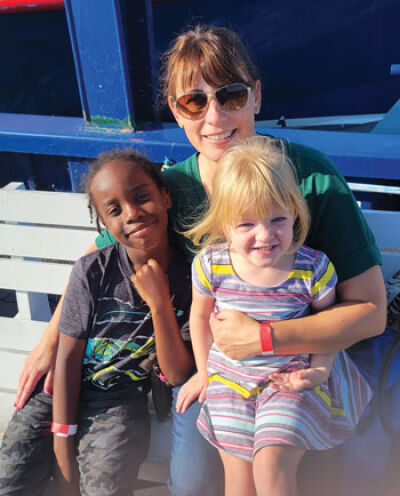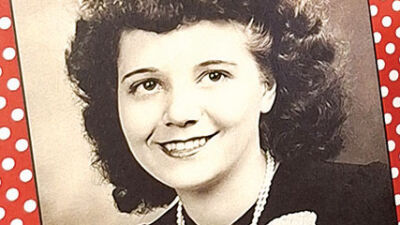
Livonia resident Jennifer Stevens became a foster parent to two children before making a decision to adopt both of them.
Photo provided by Jennifer Stevens
METRO DETROIT — Having worked in the field of child welfare for several years, Livonia resident Jennifer Stevens was aware that there are thousands of children in Michigan who don’t have a place to call home.
It is a reality that she said was weighing on her for “quite some time.”
In 2019, she decided that the time had come to act.
In April of that year, Stevens became the foster parent of a 6-year-old boy. Approximately two months later, she took on that same role for an infant girl.
“I knew once I got into the child welfare system, started working in it, that this is something that I potentially wanted to do — I was out in the community talking about the need a lot,” Stevens said. “For several years, I thought really seriously about doing it; I also knew at this point in my life that I was not, probably, going to start a family by traditional means. I was a workaholic, so my focus was on work and not really taking the time to have a personal life. So I think it just got to a point where I thought, there’s no better time. I (may) as well just go ahead and do this and quit putting it off.”
Some foster parents eventually choose to adopt children who they have fostered, and Stevens is one such individual who made that decision. She adopted her daughter in September 2020, with the adoption of her son becoming finalized last October.
When Stevens made her decision, she turned to the Judson Center, a nonprofit human services agency that has offices in Oakland, Macomb, Wayne, Genesee and Washtenaw counties.
Judson’s headquarters is in Farmington Hills.
Judson Center Chief Strategy Officer Khadija Walker-Fobbs explained part of the process for foster care and adoption.
“At any given time, we have approximately 10,500-12,000 kids that are in Michigan’s foster care system,” Walker-Fobbs said. “The goal of foster care is always going to be reunification with their birth family and trying to keep the child in the home safely with their biological families. When that is not possible and those parental rights have been terminated, then the children who are part of that foster care system become available for adoption, and a forever family would be the next goal if reunification is not possible.”
Stevens said that her daughter was available for adoption when she took her in, but her son was not.
“We worked with his family and tried to reunify them, and unfortunately, that wasn’t able to happen,” Stevens said.
Although there is a “lot of variety there,” some of the reasons courts determine that a child should be placed in the foster care system include abuse, neglect, substance abuse issues, domestic violence and untreated mental health issues.
“Typically, when they come into foster care, they work with the family to help reunify them first, so they make efforts to bring the family back together in a safe way,” said Stevens, who works for Samaritas, which is a statewide social services organization. “If that is not able to be accomplished, at some point they have to say, ‘You know, we’ve tried enough to do that; it’s just not going to happen for whatever reason, and we’re gonna look for a different permanency plan, like adoption — so something to give the children more stability.’”
When courts determine that it is not in the best interest of children to live with their biological parents, they are placed with agencies such as the Judson Center.
When reunification is still a possibility, Walker-Fobbs said, biological parents have regular visits with their children each week.
Although the preference is for children to be reunited with their biological parents within a year, she said it varies case by case.
The Michigan Adoption Resource Exchange is a statewide information and referral service for families interested in adopting youth from foster care and for adoption workers looking for homes for children.
It is a program offered by the Judson Center, with the MARE website, mare.org, providing a list of children in Michigan who are waiting for permanent homes, as well as information for families who are interested in adopting children with special needs.
MARE is funded by the Michigan Department of Health and Human Services.
According to Walker-Fobbs, 65% of the children on the MARE website are Black.
Stevens is white, as is her daughter. Her son is Black.
“It just happened by circumstance; I wasn’t necessarily seeking that, but I was open to cross-cultural placements,” Stevens said. “I prepared my home just in case by having books and toys that represented different cultures. It’s been an interesting process.”
The difference in their races has gotten the attention of Stevens’ son.
“As he’s gotten older, he’s really started to recognize that difference, and so that’s been a challenge,” Stevens said. “He’s kinda questioned not looking like us and how that’s different, but we try to keep an open conversation about it. I try to bring in different cultural things … as well as connecting with people I know and doing trainings and whatnot to understand more about his culture, so I can help him understand that.”
Although Stevens’ daughter was too young at the time of going through the foster care system to remember her biological parents, her son, who is now 9 years old, does have recollections.
“He talks about some of the stuff, and sometimes he feels that he’s happier that he’s here, and sometimes he’s upset that he’s here and not with his family,” Stevens said. “I try to help them process, especially him, and understand that, hopefully, he’s in a better place than he was before. I like to think that I am, but he still loves his family; I don’t ever wanna take that away from him — his biological family, that is. Now he’s got another family.”
For many people, part of the holiday season includes both giving and getting gifts. But from Stevens’ perspective, it’s hard to beat the gift of providing a home to children, as well as what she has received in return.
“If they couldn’t be with their family, I get to be with them every day,” Stevens said. “One of the challenges that I still work with is the fact that I want to give them everything that I possibly can and then some, and sometimes I have to remember that I’m giving them enough already. But it’s like, I wanna make up for all of the losses that they’ve had, so I tend to overdo it.”
Stevens said that her decision to take in two children is the best one that she’s ever made.
“It’s only been enriching for me,” she said. “One of the things that I appreciate the most, especially with my older child, but even with my younger one, is they know they’re adopted, and we have open conversations about feelings around that, and about our differences and our similarities. It’s taught me so much about myself, having those open conversations with them. … It’s been enriching.”
It is Stevens’ aspiration for others to also add enrichment to their lives by becoming a foster or adoptive parent.
“There’s a lot of children who need some place to stay, whether it’s temporary or forever, and we need more families to step up,” she said. “I think if people aren’t ready to step up to take in children, there’s still so many ways to support children in foster care. There’s places you can donate; there’s foster closets all over the state that you can donate gently used items to. They let foster families go and shop there and get the things that they need for the youth.”
Walker-Fobbs is of the opinion that being a foster and adoptive parent is an essential service.
“We have thousands and thousands of children statewide who are placed in care annually, and it’s our responsibility as a community to care for these children, to make sure our children are safe, and make sure every child has what they need and deserve, which is a loving, stable, safe home,” she said. “I can’t think of anything more worthy or more important than the safety, love and care of all of our children. And so when we talk about essential services, to me, this is essential. … Sometimes, people think it’s a lot scarier, a lot more cumbersome than it really is.”
Walker-Fobbs said that there is a “huge need” for homes for teenagers.
Although standard foster care ends at age 18, Walker-Fobbs said individuals can voluntarily stay in the system until they are 23 years old.
Individuals interested in becoming a foster parent must go through a licensing process and training.
Home studies are conducted when someone expresses an interest in becoming a foster parent.
According to Walker-Fobbs, 92% of adopted children are adopted by either foster parents or relatives.
Stevens suggests that individuals who are considering taking in children have a support system in place, even before starting the process.
That support system can include family, friends and even employers.
Stevens shared some thoughts for anyone who may be considering becoming a foster or adoptive parent.
“I think the most important thing for people that are considering doing it, first of all, is, nobody’s ever going to be totally ready to become a parent at all, much less a foster parent or adoptive parent,” she said. “So, you just gotta make the decision to do that.”
Those thinking about adopting are not alone in the process.
“We are there for the entire adoption journey,” Judson Center Director of Foster Care and Adoption Michelle Carlton stated in a press release. “We provide the resources and knowledge to help adoptive parents navigate the process of bringing a child into their home on a permanent basis. Our Adoption Navigators are experienced adoptive parents who offer guidance and personal expertise. Plus, the MARE website provides photos and details on the children in foster care waiting to be adopted.”
Individuals with questions can call (313) 794-5653 and ask for an adoption specialist or send an email to adoptions@judsoncenter.org.
 Publication select ▼
Publication select ▼





















